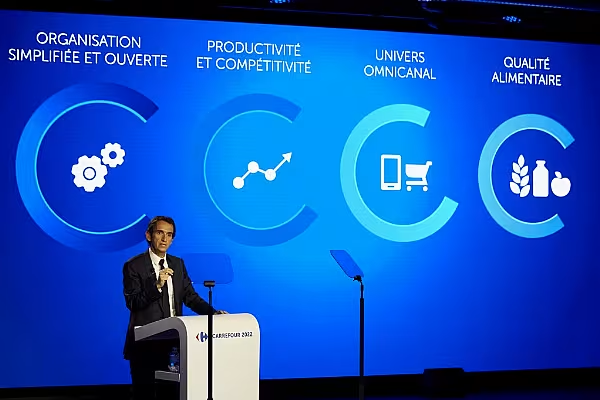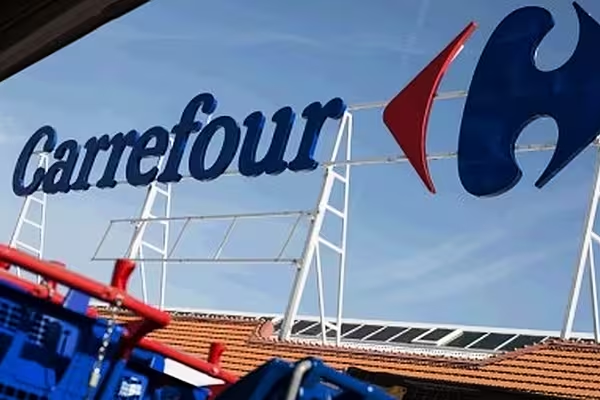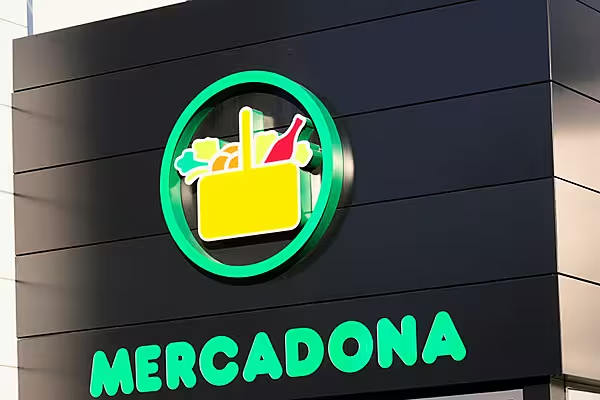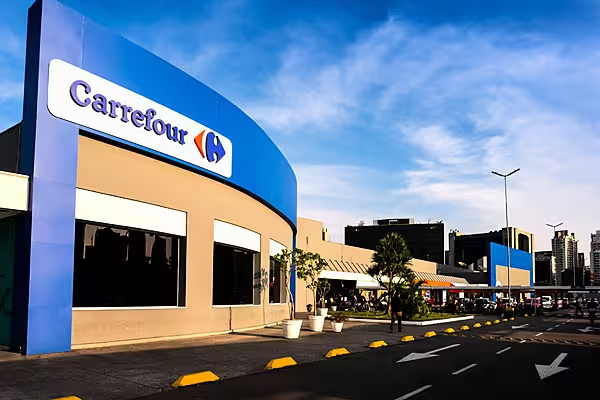Just over a month on from announcing the comprehensive Carrefour 2022 Transformation Plan, the retail giant’s CEO, Alexandre Bompard, remains confident that all the group’s objectives will be achieved, but they will take time.
“2018 is the first year of our five-year plan and the pivotal year in the transformation we are initiating,” Bompard said in a conference call with analysts yesterday, announcing the group’s full-year results.
“My attention is now 100% devoted to executing our Transformation Plan.”
Full Year Performance
According to Carrefour’s full-year results, the business saw a slowdown in group like-for-like sales, posting a full year sales increase of +1.6% in 2017, compared to +3.0% in 2016. Gross sales for the group were €88.24 billion.
In France, which is accounting for much of the effort in the group’s transformation plan, net sale were down marginally (-0.1%), to €35.84 billion, while like-for-likes were 0.8% higher.
ROI was down by a third (-32.9%) to €692 million, however this includes around €150 million worth of losses linked to ex-DIA stores.
Its Other European Countries division posted a like-for-like sales increase of 1.3%, while Latin America saw like-for-like gains of +6.1% and Asia was down 3.7%.
Objectives
In terms of the coming year, Carrefour has outlined several objectives it is looking to achieve by year-end, including achieving its first cost savings as part of its €2 billion savings plan, and investing around €2 billion in terms of capital expenditure.
But as Bompard told analysts, the group will be adopting a measured approach, rather than rush headlong into instigating rapid change.
“The execution will be measured, monitored and will follow a precise timeline,” he explained. “I’m well aware that you will assess our ability to deliver. That’s why over the past months, the teams have already been hard at work implementing the first steps of the Transformation Plan in each of its pillars.”
On the planned divestment of around 273 ex-DIA stores, Bompard said that “, the search for buyers has been initiated,” and that the group “aims to have removed these stores from our scope by year-end.”
He also noted that discussions with trade unions, cited by some analysts as a potential stumbling block in its plans to streamline operations, “have been thorough and constructive”, and the process to rationalise the group’s indirect purchasing, strict management of expenditure and the renegotiation of historical contracts is also underway.
“As for direct purchasing, the negotiations for 2018 that are ending in France are just the first step that reconfirms Carrefour’s attractiveness including for suppliers,” said Bompard.
Investing In Proposition
Carrefour is also investing significantly in improving its proposition in France’s capital, Paris, with Bompard noting that the group is “ implement an attractive value proposition for our customers in Paris […] thanks to our network of warehouses around Paris and our strong store density within the city.”
On improving food quality perceptions, one of the ‘four pillars’ of the group’s growth agenda, he added that he was “convinced that pushing this objective is not about communication, it’s about evidence”, citing ongoing work underway with the group’s merchandising, quality, marketing and private label teams to improve product quality and traceability.
In terms of achieving improving Carrefour’s price competitiveness relative to its competition, the group’s chief financial officer Matthieu Malige would not get into specifics, other than to say that “later, through the implementation of the plan, we will share with you the type of progresses that we’re making on improving our attractivity for our customers.
“What we’re saying on 2018, we will have the first gains notably on the cost savings plan, and we also have the first investments into a price competitiveness.”
Analyst Viewpoint
Commenting on the group’s outlook, analyst Bruno Monteyne of Bernstein Research said, “There was ample discussion of the cost savings (well under way) & the financial discipline (first saving costs before re-investing in price, quality and service) but no discussion (yet) about how customers are responding and whether the commercial strategy is starting to impact.
“It is understandably too early to see much impact and management did clearly confirm that obviously volume growth is the intended outcome (of the omnichannel strategy and better prices). However it feels volume recovery will come at the pace the financial frameworks allows for rather than being the first objective and lead indicator.”
In addition, Barclays European Food Retail Equity Research added, “Although it didn't provide any financial guidance and it declined to comment on the current EBIT consensus level for FY18, Carrefour management delivered a cautious outlook for this year.
“Performances will likely be impacted by a further increase in depreciation charges and the recent negative FX fluctuations, while there is no evidence that competition in France and Southern Europe will soften in the short term and the visibility on Carrefour's recovery in Argentina remains limited. Besides, the group will deconsolidate the losses of the 273 ex-DIA stores to be disposed of gradually throughout the year.
“Lastly, we believe that the €2.0bn cost savings plan recently announced might weigh on staff motivation in France and in other countries.”
© 2018 European Supermarket Magazine – your source for the latest retail news. Article by Stephen Wynne-Jones. Click subscribe to sign up to ESM: The European Supermarket Magazine.














